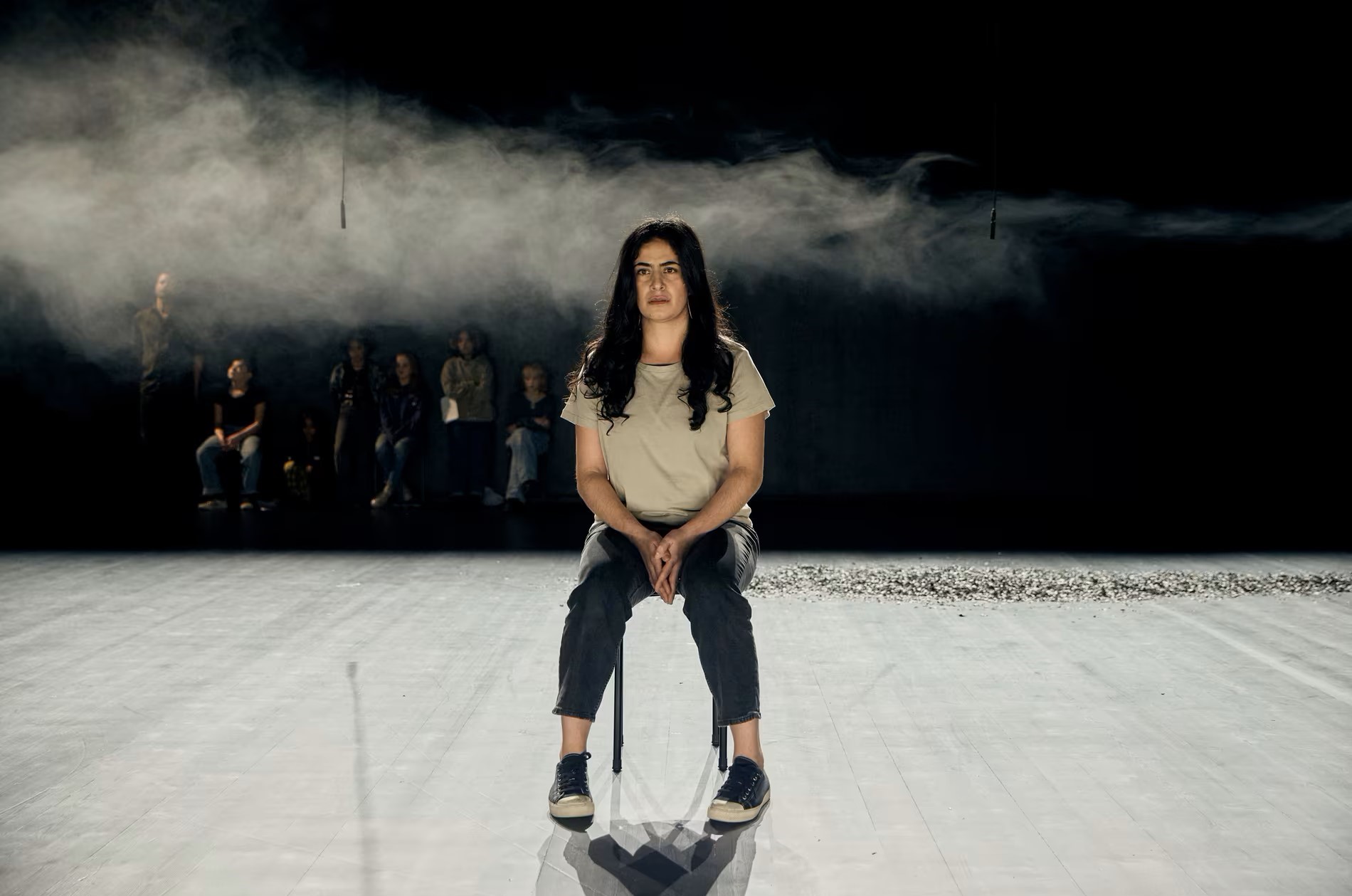from Morality According to Medea
by Athena Farrokhzad
translated by Jennifer Hayashida
Humanity had some questions and now they have been answered:
What happens to someone who has lost everything?
What can a lack of options force a woman to do?
So opens Morality According to Medea, acclaimed playwright Athena Farrokhzad’s response to Euripides’ classic tragedy. Taking up the drama where Medea ends – after the title character has murdered her children – Farrokhzad places her protagonist in a poetic dialogue with a personified Morality, as she grapples with the import of what she has done.
With a pregnant, pulsating language that feels timeless yet urgent, Medea voices her own defence – to Morality’s constant rebuttals. Throughout, Farrokhzad engages with the figure of Medea in different lights – as a woman, mother, traitor, hero and refugee – while also speaking to wider existential questions of guilt, violence, judgement and loss. Showcasing Farrokhzad’s talent as both a poet and playwright, this deftly weighted piece brings new layers to the mythical character, without fully condemning or justifying her deeds.

from Morality According to Medea
Duration: 45 minutes
Cast size: 2 people
Scene 1
Medea stands center stage inside a circle of stones. She stands facing the audience with her arms extended wide in a cross-shape.
MEDEA
Humanity had some questions and now they have been answered:
What happens to someone who has lost everything?
What can a lack of options force a woman to do?
What is a mother’s final move before she exits the stage?
Humanity had some questions and I answered them with care.
Now no one will have to live in doubt, no one will have to wonder.
Now everyone knows what someone desperate is capable of.
Someone had to claim the part and I was made for it.
Humanity had some misgivings and now they have been confirmed.
Now no one will have to live with the agony of not knowing.
But what drama will take place when the drama is over?
What will unfold when I have killed the children and the rival?
What drama will ensue when I have fulfilled my charge and the crime is complete?
Who will receive me in their home?
What children will follow me?
What man will love me?
What king will grant me asylum?
Where will I go?
I am a woman and a refugee, a mother and a killer of children.
I am a wanted criminal despised by humanity.
Someone had to be me and I made the sacrifice.
From here, the future is inconceivable.
From here, all paths are inconceivable.
This is the end of Medea.
This is the end for Medea.
This is the end according to Medea.
This is the end of the world according to Medea.
Scene 4
Medea sits on stage and gathers the stones in a pile. Morality stands behind her.
MEDEA
I am Medea.
I have killed my children for thousands of years.
Every night I prepare to repeat my deed.
I am a cruel mother, I have defiled humanity.
Only the mother who has killed her own children knows the meaning of desperation.
I had to kill my children to see if there was murder in me.
I had to know if I, robbed of all options, would turn against the children.
I had to kill to see if the opposite of morality could be found in me.
And see, vile crimes slumbered deep within.
Beneath a maternal veneer the monster waited to break free.
Beneath a shroud of humanity the inhumane waited to bloom.
Now no one need wonder about Medea’s nature.
Now everyone knows what a mother is capable of.
Now everyone is certain of what they have merely suspected.
That inside a woman like me lies the trash heap of humanity.
To offer me asylum is to take pity on a wolf.
MORALITY
It’s not a matter of your nature, it’s about your choices.
You killed your brother as early as when you left your father’s house.
You are a repeat offender.
Medea gets up and stands on top of the pile of stones.
MEDEA
If the children came to the world through me, the power to end their lives is mine.
If I made them from nothing, I have the right to transform them to nothing.
If I birthed them as mortals, I have the right to realize the consequences of mortality.
If mothers are not permitted to act wrongfully, then what is the point of wrongfulness?
If all the work necessary to keep children alive can be extinguished in an instant…
If one human’s fate is not of concern to all of humanity…
If this is what life has to offer me, I will withdraw my contribution to life.
If I do not bend in the face of nature, nature must bend to me.
I have undone birth, cancelled the life cycle.
The only justice for Medea is the one she demands.
MORALITY
The only justice for the children is if you kill yourself.
Medea picks a stone out of the pile, weighs it in her hand.
MEDEA
My children will rise again through the principle of equivalence.
They will turn to loam from which shoots will sprout.
Shoots will turn to shrubs where animals will graze.
Animals will be slaughtered and eaten by humanity.
Humanity will be custodians of my children.
Humanity will bear witness to my children and their unhappy fate.
My children will not die, my children cannot die.
My children will rise again every night so the drama can begin.
MORALITY:
Where shall we go, your children cried.
Where shall we go, Mother?
Where shall we go, wellspring of our days?
Where shall we go, guardian of defenseless offspring?
Where shall we go, giver of life?
Where shall we go, maternal branch of our family tree?
Where shall we go, flesh of our flesh?
Where shall we go, blood of our blood?
Where shall we go, if not into your arms?
Where shall we go, if your arms are the maw of the wolf?
Where shall we go, Mother, which road shall we take?
Medea strikes a stone against her head, regrets it, and lowers her arm.
MEDEA
I don’t need you.
I have my own morality.
She lives beneath my rib and swells with every attack.
She hovers above my head, ready to dive claws first.
She attacks anyone who approaches with ill intentions.
She walks near me, her bow taut.
Even when she reproaches me, she knows the need from which my deed springs.
Medea throws a stone at Morality, who catches it.
MORALITY
Sometimes I wonder if it’s possible to sink deeper into ignorance than you.
Morality throws a stone at Medea, who catches it.
MEDEA
Sometimes I wonder if it’s possible to climb higher into self-righteousness than you.
Medea throws a stone at Morality, who catches it.
MORALITY
Sometimes I wonder what I have done to be forced to be your companion.
Morality throws a stone at Medea, who lets it fall to the ground.
MEDEA
You are free to go, no one has forced you to follow me.
No one would be happier than I if I never had to see you.
No one would be more relieved to finally be left alone.
No one would miss you less.
MORALITY
Couldn’t you have avenged yourself on your husband by killing him?
Couldn’t your vengeance have been violent, but spared the children?
MEDEA
When did you become such a friend of children?
You couldn’t care less about my children.
You only pretend to be the protector of children to present yourself in a favorable light.
To you, children are just pawns in a game, a conclusion to the drama.
To you, children are a lesson, a spirit, a fact.
To me, the children are my only lifeline.
The children are my extension of flesh and blood, the embodiment of my love.
Medea sinks down on top of the pile of stones. Morality approaches.
MORALITY
Do you remember what you did with your embodied love?
MEDEA
I would never harm my children.
Their fingers are made of my cells.
Their features are my features manifest.
Their cheekbones slant like my cheekbones.
Their intestines snake like my intestines.
Their lips bow like my lips.
Their hair juts from their skin like mine.
The children are my image, my lineage, my message.
MORALITY
Sometimes I wonder if anyone has embodied the dissonance between speech and action more clearly than you.
MEDEA
Sometimes I wonder if you even know where you speak from.
How easy it is for you to play the part of morality.
How snug you are in a drama where my life is on the line.
How little you know about the choices I made, the anguish I suffered.
Morality sits down next to Medea on top of the pile of stones.
MORALITY
Sometimes I wonder if you understand how exhausted I am.
If you even understand the impossible task I have taken on.
How hopeless it is to be Medea’s companion.
How hopeless it is to time and again see you drive the drama to the edge.
How sick I am of you killing your children for thousands of years without learning a lesson.
MEDEA
I’m not the one who needs you.
You’re the one who needs me.
Without me you would have no place in this drama.
You make a living off my misery.
You’re a parasite, a leech, a tumor that swells the more I shrink.
MORALITY
In a way you’re right.
Now that the drama is over, I no longer have a mission.
I’ve played out my part, proven my point.
I’ve done what I came here to do.
Now I must also wander aimlessly.
Now you and I are at each other’s mercy.

Moral enligt Medea
Premiere: National Theatre, Oslo, 2019, directed by Kjersti Horn.
Rights: Colombine Teaterförlag
We are grateful to Colombine Teaterförlag, Athena Farrokhzad and Jennifer Hayashida for permission to publish this translated excerpt.
Athena Farrokhzad is a celebrated poet, playwright, literary critic and translator. She is the head of literature at Kulturhuset Stadsteatern, and also holds the position of professor of poetry at Linköping University. Her books have been published in twenty languages – including White Blight (tr. Jennifer Hayashida, Argos Books, 2015), reviewed in SBR 2014:1 – and her plays have been performed on a number of international stages. Moral enligt Medea has been translated into English, French, German, Norwegian and Turkish.
